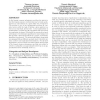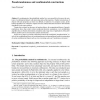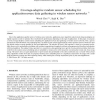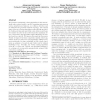2168 search results - page 24 / 434 » Randomized Algorithms and Complexity Theory |
176
Voted
CSR
2011
Springer
14 years 6 months ago
2011
Springer
The Goldreich’s function has n binary inputs and n binary outputs. Every output depends on d inputs and is computed from them by the fixed predicate of arity d. Every Goldreich�...
134
click to vote
GECCO
2007
Springer
15 years 9 months ago
2007
Springer
In the longest common subsequence problem the task is to find the longest sequence of letters that can be found as subsequence in all members of a given finite set of sequences....
131
Voted
CORR
2006
Springer
15 years 2 months ago
2006
Springer
Abstract. In combinatorics, the probabilistic method is a very powerful tool to prove the existence of combinatorial objects with interesting and useful properties. Explicit constr...
129
Voted
COMCOM
2006
15 years 2 months ago
2006
Due to the application-specific nature of wireless sensor networks, application-aware algorithm and protocol design paradigms are highly required in order to optimize the overall ...
120
Voted
PODC
2009
ACM
16 years 3 months ago
2009
ACM
We present a randomized coloring algorithm for the unstructured radio network model, a model comprising autonomous nodes, asynchronous wake-up, no collision detection and an unkno...




